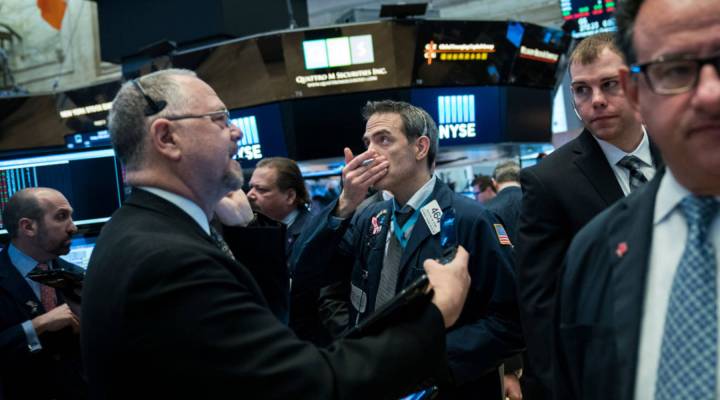
Why some people are relieved the markets are dipping

The Dow Jones started to rebound this morning after plunging almost 1,200 points on Monday, a sharp reversal from the 26,000 milestone it hit almost a month ago.
But even back then, these record highs were making some analysts nervous, which is why it shouldn’t be a surprise that they’re actually kind of relieved by the volatility we’re seeing now.
You shouldn’t panic, though: economic growth is strong, unemployment is low, and what goes down will go back up again so stick to your long-term investment plan.
Chris Farrell, a Marketplace senior economics contributor, joined us to discuss some of the reasons why analysts are calmer than you might expect and how the GOP tax bill could factor into market values. Below is an edited transcript.
David Brancaccio: So, some disbelief during the worst of it yesterday — some traders quoted wondering if someone’s fat finger pressed the wrong button or something, but wait for the paradox here: you detected, in some cases, a sense of relief?
Farrell: Yes. Now, I know it’s strange to talk about relief when you get a plunge in the market. But here’s the thing, David. Veteran investors — you know, Goldman Sachs and Blackstone, they’ve all been saying “Look, we’re hitting records every week, maybe every day. This is unreal. There’s almost no volatility. This can’t last.” So, there was sort of a sense of maybe, maybe we’re returning to a world of normalcy, a world of volatility, a world where higher interest rates have an effect on stock market values.
Brancaccio: Chris, what term should we use for what’s going on here? I mean, a correction sounds like a euphemism to many ears, but bear market — that’s a little bit much at this stage.
Farrell: Yes, I mean correction — you’re absolutely right. I mean correction has this sort of soothing, don’t get upset, it’s going to go down about 10 to 20 percent, which is the technical definition of a correction. Bear markets, down by more than 20 percent, because we’re having this discussion about what’s behind the decline in the market. Is it really inflation? That seems to be the macroeconomic story that’s being discussed, that with this global economy being strong, with the tax stimulus in the United States, that we’re going to see a rise in inflation, we’re going to see higher interest rates. And that’s going to be a big debate. I would call this the uncertain market. It is really not clear we’re going to see inflation, but that’s going to be the market whiplash: Is inflation coming or not?
Brancaccio: Now, you started to bring this up — what’s happened on markets here casts a new light on the timing of the big tax cuts which were so late in such a long recovery.
Farrell: So, what people are really watching is — we get this tax cut — will the money go into new equipment, new investment? If the money does, and I’m talking about the corporate tax cut in particular, then a lot of the concerns about inflation, it’s just not going to be there. But if the tax cuts just turns out to be something like plenty of stock buybacks and senior management options, then I think the worry about higher prices and inflationary pressures are going to grow. And I would expect the market to go lower.
| Let’s not panic about the Dow just yet |
| Corporate tax cuts: “a heist” or a way to raise wages? |
| Are you listening when we do the numbers? |
There’s a lot happening in the world. Through it all, Marketplace is here for you.
You rely on Marketplace to break down the world’s events and tell you how it affects you in a fact-based, approachable way. We rely on your financial support to keep making that possible.
Your donation today powers the independent journalism that you rely on. For just $5/month, you can help sustain Marketplace so we can keep reporting on the things that matter to you.












